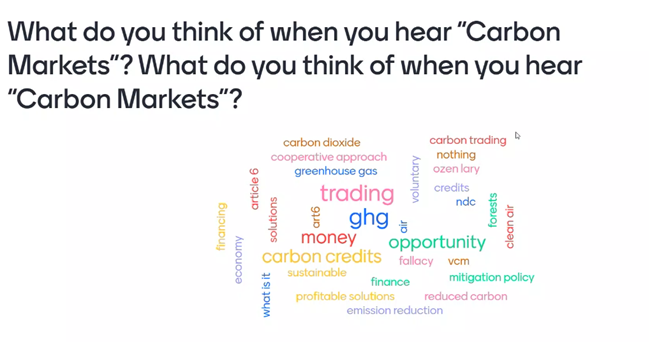In an effort to build capacity and to raise awareness, the Organization of Eastern Caribbean States (OECS) Commission with the support of the Deutsche Gesellschaft für Internationale Zusammenarbeit (GIZ) Global Carbon Market programme and in cooperation with United Nations Framework Convention on Climate Change (UNFCCC)’s Regional Collaboration Centre (RCC) in St. Georges, Grenada and Mexico2 hosted the first ever Youth Kozé on Carbon Markets for Climate Action. The Kozé (Kwéyol for chat/ conversation/dialogue), which targeted the youth in the Caribbean region, introduced the topic of carbon markets and pricing as well as the Article 6 of the Paris Agreement. Mr. David Baleese Kisakye from GIZ Uganda highlighted the opportunities that exist for youth to become active such as participating as auditors in carbon market project development cycles, engaging as Article 6 negotiators and designing Article 6 compatible carbon market projects. At the beginning of the Kozé, the participants shared some of the main challenges related to climate change that they believe are affecting the region. Some of the challenges identified include water and food security, availability of resources and lack of capacity and awareness of youth.
The ice breaker session also allowed participants to give their understanding of the term “carbon markets”. As shown in the figure below, the participants displayed a good understanding of the term, presenting ideas such as greenhouse gases, mitigation policies, emission reduction and carbon credits. During the discussion, the participants had an opportunity to share their ideas and explore solutions to the ongoing challenges in the Caribbean in relation to climate change. The breakout sessions focused on answering the following questions: “Where are we?”, “Where do we want to go?” and “How do we get there?”. Participants focused in their discussions on climate change as a serious threat for the region which demands urgent response and focused on the potential of carbon markets as an important instrument for mitigating climate change. It was widely agreed that awareness raising and capacity building on the use of international market mechanisms to reduce greenhouse gas emissions are urgently needed activities. The OECS Commission as a regional organisation will play a crucial role in facilitating this support. Furthermore, participants shared their views on the needs in the region for climate action; as one young person stated, we need to “have a forum where we can tell our own stories” and another expressed the need to “come together to create international awareness because it helps coordinate activities in the Caribbean…an alliance would help create a stronger voice on an international level and to attract investors”.
Through the presentations and the engagement of young persons in the climate change discussion, participants were able to get a better understanding of the use of carbon markets and how the region can benefit. Further steps were discussed such as bootcamps on climate actions, awareness raising activities and more Kozé dialogues and exchange of best practices through forums. The OECS Commission intends to organize future activities to integrate youth into carbon markets for climate action.

